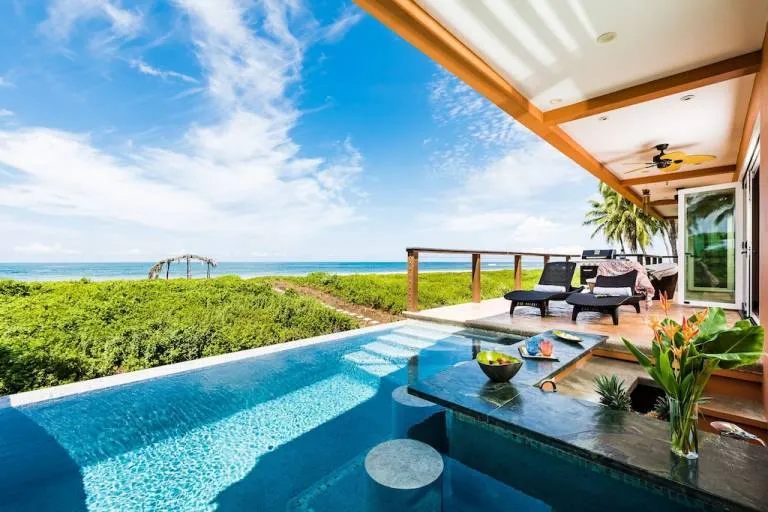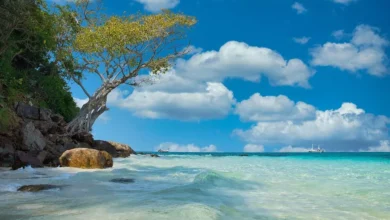Pros and Cons of Buying a Villa or Vacation Home in Costa Rica

Costa Rica is a true paradise for those dreaming of owning a home by the ocean or in the mountains. With its excellent climate, stunning nature, and stable economy, the country is an attractive option for real estate investment. In many respects, Costa Rica surpasses neighboring Latin American countries in terms of life expectancy, income levels, quality healthcare, and overall infrastructure. However, before investing in a villa or vacation home, it is essential to weigh all the pros and cons of such a decision.
Advantages of Buying a Villa or Vacation Home in Costa Rica
1. Perfect for Relaxation and Well-being
Costa Rica is famous for its favorable climate, with minimal temperature fluctuations throughout the year. Both winter and summer maintain an average temperature of around 28°C (82°F). The country has two main seasons: the dry season (December to early April) and the rainy season (May to November). This tropical climate makes Costa Rica one of the best places for rejuvenation and relaxation.
Owning a vacation home by the ocean or in the mountains provides freedom and comfort, allowing you to visit anytime without worrying about hotel costs or rental availability.
2. Ideal for Retirees
If you are retired or looking for a home for your parents, Costa Rica is an excellent choice. It is one of the top destinations for retirees due to its warm climate, which improves circulation, supports the musculoskeletal system, and benefits cardiovascular health.
Additionally, Costa Rica offers world-class healthcare, available in both public and private clinics. The country has specific residency programs for retirees and investors. For example:
- Pensionado Program: Designed for foreign retirees with a stable monthly pension income of at least $1,000 USD.
- Rentista Program: Suitable for individuals who can provide a bank guarantee of a minimum monthly income of $2,500 USD for two years or show at least $60,000 USD in a Costa Rican bank account.
These programs make it easier for retirees to establish long-term residency in Costa Rica.
3. Great for Families with Children
Costa Rica’s combination of a mild climate, fresh ocean air, year-round availability of fruits and vegetables, and lush jungles makes it a highly attractive location for families with children. Buying a villa in Costa Rica https://puntauvarealty.com/houses-for-sale/ or vacation home on the coast solves the annual question of where to spend family holidays.
For those considering permanent relocation, Costa Rica offers high-quality private education with international programs, as well as excellent healthcare services for children of all ages.
4. Profitable Investment: Rental Income and Property Value Growth
Purchasing real estate in Costa Rica is not only a lifestyle choice but also a smart investment. The booming tourism industry has created high demand for vacation rentals, especially beachfront properties.
Buying a villa or house as an investment allows you to generate stable rental income, particularly in popular tourist destinations. Additionally, real estate values have steadily increased over the years, making property in Costa Rica a promising long-term investment.
5. Wide Range of Residential Real Estate Options
The Costa Rican real estate market offers a diverse selection of homes and villas catering to international buyers. You can find everything from luxury oceanfront villas to cozy townhouses in well-developed areas. The price of a property depends on several factors:
- Number of rooms and floors
- Land and home size
- Location (proximity to beaches, infrastructure, and attractions)
- Interior finishes and furniture
- Additional amenities (pools, gardens, outdoor spaces)
- Construction stage (properties can be purchased at different stages of completion)
Regardless of your budget or preferences, there are plenty of options available in Costa Rica’s real estate market.
Potential Drawbacks to Consider
1. Managing Property Remotely
If you do not plan to live in Costa Rica year-round, managing your property remotely can be challenging. You may need to hire a property management company to maintain your home, which could add extra costs.
2. Bureaucratic and Legal Considerations
Although the real estate purchasing process is relatively straightforward for foreigners, it is important to work with legal professionals to verify documents, handle transactions, and comply with tax regulations. Hiring an experienced real estate attorney is highly recommended to navigate local legal requirements.
3. Tropical Climate and Home Maintenance
Costa Rica’s humid tropical climate can affect home maintenance, particularly for oceanfront properties. Salt air can cause metal corrosion, and wooden structures may require frequent upkeep to prevent deterioration. Selecting high-quality construction materials and hiring professionals for regular maintenance are essential steps in protecting your investment.
4. Initial Investment Costs
Beyond the purchase price, additional costs for furnishing, renovations, or property adjustments to meet personal preferences may be required. These expenses should be factored into the overall investment plan when buying a vacation home in Costa Rica.
Conclusion
Buying a villa or vacation home in Costa Rica is an excellent choice for families, retirees, and investors seeking a personal retreat in paradise. The key to a successful investment is conducting thorough market research, selecting the right location, and working with reputable real estate agencies and professionals. By considering all aspects of the purchase, you can ensure that your investment is both enjoyable and financially rewarding.





